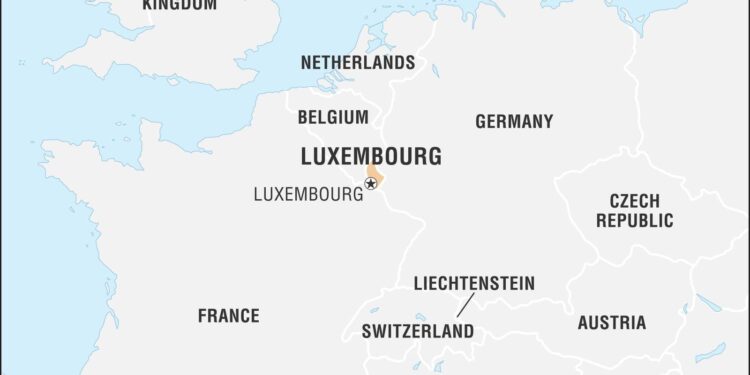Luxembourg’s trade imbalance expanded notably in August, according to the latest data analyzed by TradingView. The widening trade gap underscores growing challenges in the country’s import and export dynamics amid shifting global economic conditions. This development raises questions about the impact on Luxembourg’s economic stability and trade policies as the nation navigates ongoing international market fluctuations.
Luxembourg’s Trade Deficit Expands Sharply in August Reflecting Rising Imports
In August, Luxembourg experienced a notable increase in its trade deficit, driven primarily by a surge in imports. The country’s import bill rose sharply, signaling growing domestic demand and increased consumption of foreign goods. Key sectors such as machinery, vehicles, and electronics contributed significantly to the higher import figures, reflecting both business investment and consumer spending patterns. Meanwhile, exports struggled to keep pace, displaying modest gains that failed to offset the expanding gap.
Trade figures at a glance:
- Imports: Up 12.4% compared to July, reaching €6.8 billion
- Exports: Incremental growth of 3.7%, totaling €5.1 billion
- Trade deficit: Widened to €1.7 billion, marking the largest monthly shortfall this year
| Category | July (€ billion) | August (€ billion) | % Change |
|---|---|---|---|
| Imports | 6.05 | 6.80 | +12.4% |
| Exports | 4.92 | 5.10 | +3.7% |
| Trade Deficit | 1.13 | 1.70 | +50.4% |
Analysts caution that while strong imports often indicate robust domestic activity, the persistent widening of the trade deficit may raise concerns about external balances and Luxembourg’s economic resilience amid global uncertainties. Policymakers will likely monitor these developments closely, emphasizing the importance of boosting export competitiveness to narrow the gap moving forward.
Analyzing Sectoral Trends Driving the Widening Trade Gap
The recent expansion in Luxembourg’s trade gap is largely influenced by divergent sectoral performances that reveal underlying economic shifts. Notably, the manufacturing sector experienced a slowdown in exports due to supply chain disruptions and increasing raw material costs, which dented competitiveness on the global stage. Conversely, the services sector, particularly financial services, sustained steady export growth but was insufficient to offset the broader manufacturing deficits. Additionally, increased imports of consumer electronics and machinery, reflecting robust domestic demand, have exacerbated the trade imbalance further.
Examining the detailed trade flows provides clearer insight into these dynamics:
| Sector | Export Change (YoY) | Import Change (YoY) | Impact on Trade Gap |
|---|---|---|---|
| Manufacturing | -8% | +12% | Negative |
| Financial Services | +5% | +3% | Neutral |
| Consumer Goods | +2% | +15% | Negative |
| Energy | -3% | +7% | Negative |
- Manufacturing sector’s decline is the principal contributor to export setbacks.
- Growing imports in consumer goods and energy indicate rising domestic consumption and energy requirements.
- Financial services remain resilient, providing a partial cushion against overall trade pressures.
Policy Recommendations to Address Luxembourg’s Trade Imbalance
To counter Luxembourg’s growing trade imbalance, strategic policy adjustments are essential. Authorities should focus on fostering export diversification by incentivizing emerging sectors such as technology, green energy, and advanced manufacturing. Strengthening trade partnerships beyond traditional EU markets can open new avenues for Luxembourg’s products and services, reducing dependency on a limited set of trading partners. Additionally, investing in innovation hubs and enhancing workforce skills will enable local companies to compete globally, adding value to exports and bridging the trade gap.
Moreover, enhancing the country’s import substitution capabilities through support for local production can mitigate excessive import reliance. Policymakers might consider:
- Tax incentives for domestic producers in key sectors
- Streamlining custom regulations to favor local businesses
- Encouraging public-private partnerships to boost research and development
- Promoting sustainable trade practices aligned with EU Green Deal objectives
| Policy Focus | Expected Impact |
|---|---|
| Export Incentives | Broaden market reach, higher export volumes |
| Import Substitution | Reduce dependency, strengthen local industries |
| Innovation Support | Enhance product competitiveness |
| Sustainable Trade Policies | Long-term economic and environmental benefits |
Closing Remarks
As Luxembourg’s trade deficit expanded further in August, questions remain about the underlying factors driving this shift and its potential impact on the country’s economic stability. Analysts will closely monitor upcoming trade data and policy measures to assess how Luxembourg can address the growing gap. For now, the widening trade imbalance signals ongoing challenges in balancing imports and exports amid a complex global trade environment.
















